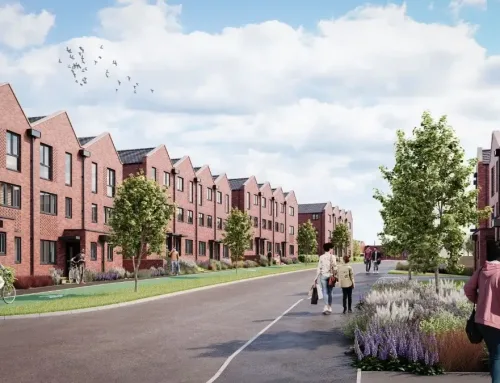There weren’t many surprises from a housing point of view included in the speech, with many of the key headlines being announced ahead of time. Positives came in the reiteration of the government’s commitment to building more affordable homes but many in the housebuilding industry see the Budget as a missed opportunity to reform Stamp Duty tax and introduce support for first-time buyers.
The current Affordable Homes Programme will be boosted by £500million to deliver an additional 5,000 affordable homes. The extra funding comes ahead of the government’s housing strategy which is due in spring 2025.
Reeves also said that “hundreds of planning officers” will be hired in a bid to accelerate housebuilding, a commitment that Labour has made since it took office.
It was also announced that right-to-buy discounts will be reduced, with local governments retaining the earnings from council housing sales to allow them to reinvest.
A five-year rent settlement for social landlords has also been announced, with the intention to increase rents in line with the CPI measure of inflation plus 1%, as is the case under the existing settlement that expires in April 2026.
The rate of Stamp Duty tax paid on second home purchases will rise from 3% to 5% from tomorrow (31/10), with Reeves saying that this is in a bid to raise revenue for first-time buyers. A discount that is due to expire in March 2025 will not be extended by the current government.
Here’s how the housebuilding industry has reacted to the Budget:
John Anderson, chief executive of Allison Homes, said: “The mood music in the housing industry is undoubtedly more positive since the new government announced its commitment to housing targets, planning reform, and investment in delivering more affordable housing. They should take great credit for this in such a short space of time.”
“However, delivering the 1.5 million new homes will be largely dependent on confidence – confidence that planning permissions can be achieved in the right places and efficiently, confidence that skilled labour and materials are available to avoid unnecessary construction delays, and confidence there is demand from buyers and registered providers. The budget had the chance to add more confidence to these areas. While investing in local authority planning teams and affordable housing are positive steps, it will sadly not go far enough.”
“The extra funding is welcomed but our first-time buyer customers are telling us that it is much harder to get on the housing ladder with current interest rates and without schemes, such as Help to Buy, being available. And, without addressing the skills, labour and materials shortage, homes can only be built so quickly.”
“Are things moving in the right direction? Yes, I believe they are, but we urgently need the government to provide certainty over the planning reforms, speed up the adoption of Local Plans, and set about making it easier for people to buy their homes if we really want to tackle the housing shortage.”
Melanie Leech, chief executive of the British Property Federation, commented: “With no concessions on the overall business rates burden today’s announcements on this are just robbing Peter to pay Paul. However, the Chancellor has at least recognised the business rates system is broken and has signposted the direction towards a reformed system. In the meantime, recognition of the unsustainable burden on retail, leisure and hospitality sectors and measures to continue to support them are welcome, but alongside the employer tax increases announced don’t go far enough to provide our high streets with the protection they need today.”
“Measures to support the delivery of more homes are welcome but the Chancellor knows that much more is needed if the government is to deliver on its 1.5 million homes pledge. The promised housing strategy needs to be much bolder and go much further. This includes unlocking the billions of pounds of investment into the build-to-rent sector, so it is particularly disappointing that Rachel Reeves did not take the opportunity to reverse the previous Government’s decision to abolish multiple dwellings relief announced in spring.”
Nick Sanderson, Audley Group CEO, said: “The new government’s Budget crept by with only one mention of stamp duty – an increase for those buying second homes. No mention of Stamp Duty reform for downsizers which could do so much to get the market moving. A disappointing blow but it’s the silence on wider housing reform that is more haunting. Housebuilding targets and overhauls to the planning system are empty promises without the devil that is in the detail. Progressive and decisive action is needed if Labour are to get a handle on the issues that plague the housing system, and implement real change.”
Lucian Cook, head of residential research at Savills, said: “Any relief buy-to-let landlords and second homeowners may have felt from seeing their exposure to Capital Gains Tax unchanged will have been very short-lived given an increase in the SDLT surcharge.”
“The risk is that it further constrains the supply of private rented accommodation, keeping upward pressure on rents. New buy-to-let investors will be very thin on the ground, and even existing larger, wealthier, landlords, will think very carefully about whether they continue investing.”
“That means there will be a thinner seam of demand and fewer options for those looking to exit the sector.”
Bjorn Howard, group CEO at Aster, said: “We’re encouraged by the social rent consultation announced in the Budget. A five-year settlement will help create some certainty. It means we can better plan for the long-term for vital things like our investment programmes in our existing homes so they’re the best quality they can be, while continuing our work to support our customers with their financial well-being.”
“Further support for social housing is good news, and we welcome every government measure that helps address the housing crisis. Today’s additional funding for the Affordable Homes Programme is another positive step forward, and we hope it’s a sign of greater things to come in the Spring Statement. It’s also encouraging to see the funding for 300 new planning officers, recognising the pressures local authorities are under when it comes to managing the applications for much-needed affordable homes.”
“Support for every type of tenure is essential if the country is to deliver a safe, quality home for everyone. This includes shared ownership, which is an underutilised route to owning a home, and community-led housing projects. Schemes like these which allow local voices to be heard during their design will be an important part of the plan to create truly affordable homes. Collaboration will be critical, and we will continue to play our vital role in supporting housing delivery.”
Andy Hill OBE, chief executive of The Hill Group, commented: “Labour has made a promising start, but it’s crucial they maintain strong momentum and keep their foot firmly on the accelerator. My concern is that they’ve entered the race too cautiously and without a sense of urgency – their target of 1.5 million homes is at risk due to a slow start. Delaying critical decisions on affordable housing funding in the next term until the spring is a disappointment and risks feeling like yet another setback for the industry to step up delivery.”
“That said, the additional £500million for affordable homes in the current programme is an extremely positive step. This funding will allow stalled projects to resume, providing a boost to developments like our scheme in Coventry, we hope, where nearly 1,000 homes in the city centre can now progress confidently through the next stages without further delay. It’s a welcome injection of support for much-needed housing.”
“However, the government has missed a key opportunity by not prioritising first-time buyers. The housing market typically grows from the ground up, and support for first-time buyers is essential for driving market momentum. While the reduction in mortgage rates is a positive development – making homeownership more attainable than renting in many cases – additional incentives could further stimulate demand for new entrants and create a more robust housing market.”
“Attracting private investment into housing must also be a priority, but this requires a stronger framework for long-term rental agreements to build investor confidence. The current five-year window is simply too short; longer-term policies are necessary to give institutional investors the certainty they need to commit funds into the affordable housing sector. Deploying funds can take five years, and market conditions may shift significantly in that time. A longer-term commitment would ensure investments are secure, sustainable and profitable, creating a more stable environment for private capital to flow into housing.”
‘Source: Showhouse’













